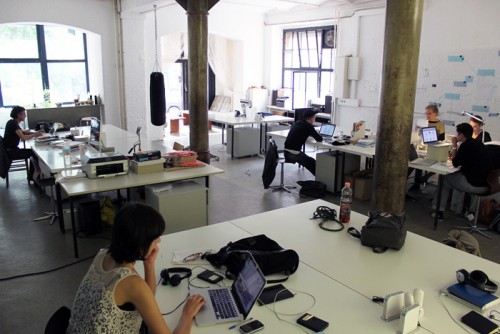In larger cities, there’s a growing trend of more people working outside of traditional offices. Some are trying a practice called coworking, where self-employed people share office space.
Coworking in earnest began in 2005, when professionals including technologists, programmers and creative professionals wanted to work outside the office environment, but also avoid the isolation of home offices, according to an October 2014 article, “Workspaces That Move People,” in the Harvard Business Review. “They chose to work side by side, in what are known as coworking spaces,” it noted.
This week, the New York Business Journal asked whether coworking could be a solution to entrepreneurs’ depression. It is holding a TweetUp at 2 pm ET today, using #startupdepression, to talk about the situation.
According to Small Business Labs’ global coworking forecast, the number of global coworking facilities basically has been doubling in number each year. The forecast expects to see 12,000 global coworking spaces operating in 2018.
Up to date data on the trend is a little slim. But, HBR cites a 2011 Deskmag survey of more than 1,500 coworkers in 52 countries that found:
- 75 percent reported an increase in productivity since joining their space;
- 80 percent reported an increase in the size of their business network;
- 92percent reported an increase in the size of their social circle;
- 86 percent reported a decrease in their sense of isolation; and
- 83 percent reported that they trusted others in their coworking space.
“The growth of coworking and surveys of coworkers demonstrate that given the choice, people will choose workspaces that support their digital style while giving them access to new knowledge, exposing them to different kinds of expertise, and accelerating their learning,” said the HBR article.
Coworking spaces with great amenities are popping up all over the world. There’s a new coworking hub for hardware products in Stockholm. Here are some in the U.S.
Download our free guide to covering money on 17 beats.
We Work has locations in 10 U.S.cities, along with outposts in London, Amsterdam and Israel. Individual memberships start at $45 a month, while private offices start at $750 a month. It offers amenities including workspace, conference rooms, community managers, event and lounge space, free beer, high-speed Internet and private phone booths.
Austin, Texas-based Link Coworking says it’s “bringing sexy back to the workplace.” The space is the brainchild of Liz Elam, who worked for Dell Inc. for 14 years, then managed a multi-million dollar business from her home office. When not at home, she found herself jockeying for space at Starbucks or renting expensive meeting space.
Link Coworking offers fast internet access, connectivity and power at every seat in a common work area, private spaces and phone booths, free drinks and snacks and mailbox services. A freelancer punch card costs $400 for 10 visits, while memberships start at $300 a month with an annual contract.
In San Francisco, Parisoma was created to foster an experimental environment that emphasizes openness and collaboration. It targets freelancers and early-stage companies with the space and tools needed to grow their businesses.Memberships start at $345 a month for flexible seating and three hours of free conference room access, Wi-Fi, printers, conference rooms and coffee and tea, along with access to 300 classes and events a year.
For story ideas, check and see if your city has coworking spaces and see how those who have memberships are using them.
STORY IDEAS
Small Business Labs’ 2014 to 2018 global coworking forecast
“Workspaces That Move People.”
10 Things You Probably Don’t Know About Coworking
***
Learn how to cover money better on your beat. Register for one of our upcoming workshops.










